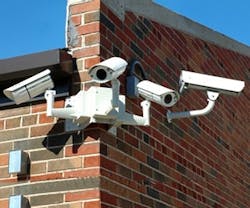Make Your Building Unattractive To Security Threats
In 1972, Arthur Bremer followed President Richard Nixon to Ottawa to assassinate him. Security was so tight that Bremer changed his mind and went after presidential candidate George Wallace. Bremer shot Wallace at a campaign event in Laurel, Md., when Wallace left a podium protected by bulletproof glass and waded into the crowd.
Security made President Nixon an unattractive target. Lack of security made Wallace an inviting target. Building security works the same way.
The right deterrents can make a building unattractive to criminals and cause them to go elsewhere. Effective techniques to repel potential delinquents include creating secure environments, escorting tenants, installing visible technology, setting policies directed at security problems, and involving tenants in security.
Create a Secure Environment
You needn’t turn your building into a fortress to make it a difficult target. Instead, make it attractive to your tenants.
“Bad actors like dark, quiet, deserted areas with niches where they can hide,” says James Black, CPP, CET, a senior security consultant in the Irvine offices of Boston-based TRC. “Conversely, tenants like bright, crowded areas.”
Trim landscaping around the sides of the building to eliminate niches where transients might hide at night. Suppose your building has a deserted courtyard. Black suggests reconfiguring it to attract people. Light it up. Play music. Make it into a gathering place for lunch.
Escort Tenants
Dark, quiet parking lots and structures attract muggers. Tenants that work late shifts or work into the night make easy targets.
Good lighting in parking areas combined with emergency call stations can mitigate this risk. “I recommend emergency call stations every 100 to 150 feet in urban underground garages,” says Black. “They should be equipped with strobe lights and sirens and supported by video.”
Black also recommends security escorts. Large facilities with ample security officers can provide personal escorts after hours.
“You can also provide video escorts by setting up cameras along routes from the building to the parking area,” Black says. “A security officer would monitor the video.”
In some cases, adds Black, owners make the video escorts available to individual tenants on request. When arriving or leaving, the tenant calls security, and an officer follows the individual to or from his or her vehicle. Signs promoting the service to tenants can also deter would-be muggers.
Technology Discourages Thieves
Unlike muggers, thieves steal when no one is looking. “Visible security deters thieves,” says Jonathan Lusher, a principal with I-3 Security Services in Kerrville, Texas. “Put video cameras up in plain sight. Announce the cameras with signs. Station a security guard and cameras at the front door and use cameras and intercoms at side doors.”
Though such steps can discourage thieves from entering a building, studies show that tenants and outside contractors such as cleaning crews also commit many office thefts.
Altering procedures can discourage this, Lusher says. While investigating recent thefts of electronic devices and cash in a 12-story Chicago office building, Lusher discovered that the cleaning crew was working unsupervised. “They were taking things out of the building in green trash bags,” he explains.
Lusher recommended adding a supervisor to the crew. Among the supervisor’s duties: search the trash bags before taking them outside. The thefts stopped immediately.
“Making thieves perceive that they will be caught will drive them away,” adds Black. “One way to create that perception is to invite the police to your building. The police constantly train officers. They carry out tactical exercises, drill incident management techniques, practice hostage negotiations and much more. Call the police station and offer your building as a training site a couple evenings a month. Criminals won’t like it. Better yet, if you ever have an incident requiring a police response, the police will know your building.”
Set Policies and Involve Tenants in Security
What might happen if someone with a gun went on a rampage in your building? Where are the escape routes? Every floor should have multiple exits. A shooter arrives from this direction; people leave in that direction.
It’s also important to set policies. “You should rethink policies in light of a potential shooter,” says Jason Rosen, EPACS Program Manager, Office of Protective Services at NASA headquarters in Washington, D.C. “For instance, smoking is prohibited within a certain number of feet of buildings in many cities. So smokers prop open a door and go outside to smoke. A disgruntled employee would know about this and could use it as a route into the building. A smoking regulation that leads to propping open a locked door requires a building policy response.”
Lusher notes that reports about shootings in office buildings typically include interviews with friends and acquaintances of the shooter describing behavior that should have indicated a problem. Yet no one reported it. “Train supervisors to recognize signs and to report them,” Lusher says.
Black recommends creating an anonymous ways to report behavior indicative of psychological stress. People can be reluctant to report behavior that might cause someone to turn on them. “Enabling people to make anonymous reports can help,” Black says.
In the end, involving tenants in security might be the most important thing an owner or property manager can do to make a building unattractive to criminals. Tell them to report people that look out of place or aren’t wearing an ID badge. Advise them to keep an eye on delivery people or contractors working in the building. They will make the building safer and that will make the building more attractive to new tenants.
